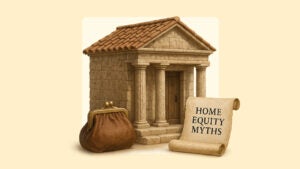What are property taxes, and how are they calculated?




As a homeowner, you will have expenses to cover for as long as you own your home. One of those expenses is property taxes, which are computed on an annual basis and paid to your state and municipality.
According to the U.S. Census Bureau’s 2022 American Community Survey, the median annual property tax bill in the U.S. is $2,869 — but your tax bill will vary depending on where you live, your home’s value and any adjustments made for exemptions. Since property taxes are a required expense, it’s smart to understand how they work before you buy a home. Here, we explain what property taxes are and how they are calculated.
What are property taxes?
Property taxes are an unavoidable part of the cost of owning a home, so it’s good to know what the funds are used for and where your money is going. State and local governments rely on property taxes to fund public services and infrastructure. This might include the police department, public schools, local parks and libraries, bridge and roadway maintenance and much more. Typically, the relevant taxes are broken out on your tax bill.
According to the Census’s Annual Survey of State and Local Government Finances, area governments collected more than $630 billion in property taxes in 2021 (the latest year for which national figures were available).
How are property taxes calculated?
Your state and local governments determine how your property taxes are calculated. Generally, this is done by multiplying your home’s assessed value by the local property tax rate. There are two formulas that could be used:
Assessed home value x tax rate = property tax
Assessed home value x mills / 1,000 = property tax
Depending on where you live, a home’s assessed value or market value might be used in this calculation. These are not the same thing: A home’s market value is how much the home would sell for, based on local market conditions and comparable sales of other properties in the area. The assessed value is often lower. That’s because market value is based on the best potential use of the property, regardless of its current condition — whereas tax assessors must value the property based only on the current condition as it is. All tax valuations in a particular jurisdiction must be as of the same date, called the “tax status date.”
Homeowners should note that not all states use 100 percent of the property’s value when calculating the taxable value. Many jurisdictions use a fractional assessment system, assessing at a smaller fixed percentage of the value. And exemptions like the homestead exemption (see below), or others that might be available for veterans, senior citizens and more, can lower a tax bill. Additionally, some states have property taxation limits that keep property taxes below a certain amount.
How are property taxes paid?
If you’ve never paid property taxes before or you’ve moved to a new area, you might have a few questions about how to pay them. For example, where do you send the money? And do you pay property taxes monthly or yearly?
In some cases, you’ll pay property taxes directly to your local tax authority, either annually or semi-annually. In this case, you will get a bill with the appropriate info — be sure to confirm the accepted forms of payment.
In other cases, you can add them to your monthly mortgage payments when you buy the home. In fact, many mortgage lenders will require a certain amount of property taxes to be prepaid, and the funds are then held in escrow and paid out as needed by your mortgage servicer. Many people find it easier to pay this way, rather than have one more bill to keep track of, but be sure to double-check your escrow statements to make sure the funds actually are being paid on time.
Can you deduct your property taxes?
Yes, within limits. The IRS’s state and local tax (SALT) deduction allows taxpayers to deduct their property taxes on their federal tax returns, as well as their state income taxes or their sales taxes (but not both). The Tax Cuts and Jobs Act passed in 2017 limited the SALT deduction to $10,000. Before the 2018 tax year, the SALT deduction had no cap.
It’s important to note that you must itemize your tax deductions to take the SALT. Just taking the standard deduction on your tax return may be quick and easy, but itemizing might get you a bigger tax refund, especially if you live in a state with high property taxes. You may want to have a tax professional run both calculations to see which offers the biggest benefit.
Common property-tax exemptions
Property taxes can be a financial burden for some, but deductions, credits and exemptions can potentially lower the amount you owe. Some common property-tax exemptions include:
- Homestead exemption: If you qualify, a homestead exemption will allow you to reduce the taxable value of your primary residence by a predetermined amount. The rules for this exemption vary by state.
- “Circuit breaker” programs: Property tax circuit breaker programs reduce property tax liabilities for seniors, disabled people, low-income residents and others who qualify. These programs also vary widely among the states that offer them.
- Tax deferrals: Seniors, disabled homeowners and others may qualify to defer property tax payments until the sale of the property or the death of the owner.
You can get details on the programs mentioned above, and other deductions, credits and exemptions, from your local tax authority or by talking to a tax professional.
FAQs
-
Property taxes are typically paid semi-annually or annually, but it depends on your local tax authority. If you prepay your property taxes at closing, as many lenders require, the funds are held in escrow and disbursed on your behalf. Be sure to stay on top of on-time payments to avoid penalties (or, worst-case scenario, a tax lien on your property).
-
They can be. Mortgage payment costs are often known by the acronym “PITI,” which stands for principal, interest, taxes and insurance — the “taxes” part is your property tax payment. If yours are not structured this way, you’ll likely need to pay your local tax authority directly.
-
Yes, property taxes are often part of a home transaction’s overall closing costs. Buyers are often required to prepay a certain amount of their property taxes upfront, while sellers often pay a prorated fee that covers the entire period they owned the home, up until closing day. If the seller had to pay upfront taxes beyond the closing date, the buyer may be asked to reimburse them through the date of sale.
Why we ask for feedback Your feedback helps us improve our content and services. It takes less than a minute to complete.
Your responses are anonymous and will only be used for improving our website.




